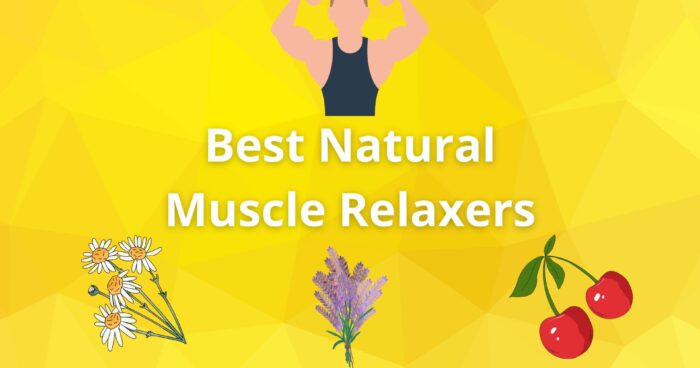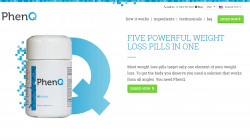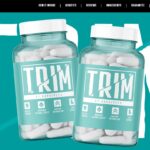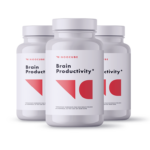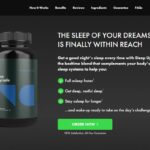As someone who regularly engages in physical activity and occasionally experiences muscle tension and soreness, I’ve found myself looking for effective muscle relaxers that don’t come with the potential side effects of prescription medications.
That’s where natural muscle relaxers come in.
These substances, which are often derived from plants, can help to relieve muscle tension, reduce inflammation, and promote relaxation without the risks associated with some prescription medications.
In this article, I’ll be sharing some of the best natural muscle relaxers that I’ve come across in my own research and personal experience.
Whether you’re an athlete, someone who spends a lot of time sitting at a desk, or just someone who occasionally experiences muscle tension, I hope you find this information helpful.
1. Best Natural Muscle Relaxers
1.1 Magnesium
Magnesium is a mineral that is involved in a variety of bodily functions, including muscle and nerve function, energy production, and bone health. It is also essential for proper muscle contraction and relaxation.
Magnesium acts as a natural muscle relaxer by regulating muscle contractions, reducing muscle tension, and promoting relaxation. When you are deficient in magnesium, your muscles can become more easily fatigued, and you may experience more muscle tension and soreness. Supplementing with magnesium can help to reduce these symptoms.
You can take magnesium in several different forms, including:
- Supplements – Magnesium supplements come in a variety of forms, such as magnesium citrate, magnesium glycinate, and magnesium oxide. These supplements are available over-the-counter at most health food stores and pharmacies.
- Foods – Magnesium can be found in many foods, such as dark leafy greens, nuts, seeds, whole grains, and some types of fish.
- Topical applications – Some magnesium supplements come in the form of topical creams or sprays that can be applied directly to the skin. This can be a good option for people who have difficulty tolerating oral supplements.
1.2 Valerian Root
Valerian root is an herb that has been used for centuries as a natural remedy for anxiety, insomnia, and muscle tension. It contains several compounds, including valerenic acid and valeranon, which have been shown to have sedative and muscle-relaxing effects.
Valerian root is thought to work by increasing the levels of a neurotransmitter called GABA in the brain. GABA is a chemical that helps to reduce the activity of the nervous system and promote relaxation. This can help to calm the mind and reduce muscle tension, making it a useful natural muscle relaxer.
Valerian root is available in several forms, including:
- Supplements – Valerian root supplements are available in capsule, tablet, or liquid form. They are often sold as a sleep aid or a natural remedy for anxiety and stress.
- Tea – Valerian root can also be consumed as tea. To make valerian tea, steep 1-2 teaspoons of dried valerian root in hot water for 10-15 minutes.
- Tinctures – Valerian root tinctures are concentrated liquid extracts of the herb. They are often taken under the tongue or added to water or juice.
1.3 Chamomile
Chamomile is a medicinal plant that has been used for centuries to treat a variety of health conditions. The two most commonly used types of chamomiles are German chamomile (Matricaria chamomilla) and Roman chamomile (Chamaemelum nobile).
Chamomile contains several compounds that are believed to have muscle-relaxant properties, including flavonoids, terpenoids, and apigenin. These compounds work by reducing inflammation and relaxing the smooth muscles in the body, which can help alleviate muscle spasms, cramps, and tension.
There are several ways to take chamomile, including:
- Chamomile tea – Drinking chamomile tea is one of the most popular ways to consume chamomile. To create chamomile tea, steep a tea bag or a tablespoon of dried chamomile flowers in hot water for 5-10 minutes.
- Chamomile essential oil – Chamomile essential oil can be applied topically or inhaled through a diffuser. To use chamomile essential oil topically, mix a few drops with a carrier oil, such as coconut or almond oil, and massage it onto the affected muscles.
- Chamomile supplements – Chamomile is also available in supplement form, including capsules and tablets. Follow the dosage instructions on the product label, and speak with a healthcare professional before taking any supplements.
1.4 Cherry juice
Cherry juice is a beverage made from the juice of cherries. Tart cherries, also known as sour cherries, are particularly rich in certain compounds that are believed to have muscle-relaxant properties.
The compounds responsible for the muscle relaxant properties of cherry juice are known as anthocyanins, which are powerful antioxidants that help reduce inflammation and oxidative stress in the body. Tart cherries are particularly rich in anthocyanins, which is why tart cherry juice is often recommended for muscle relaxation.
Some studies have found that drinking cherry juice can help reduce muscle soreness and inflammation after intense exercise, making it a popular natural remedy among athletes.
To consume cherry juice, you can either make it at home using fresh cherries or purchase pre-made cherry juice from a grocery store or health food store. Tart cherry juice is generally recommended for its higher concentration of anthocyanins.
1.5 Cayenne pepper
Cayenne pepper is a spice made from dried and ground chili peppers. It’s commonly used in cooking to add heat and flavor to dishes, but it’s also been used for medicinal purposes for thousands of years.
Cayenne pepper contains a compound called capsaicin, which is believed to have muscle-relaxant properties. Capsaicin works by reducing the activity of a neurotransmitter called substance P, which is involved in transmitting pain signals to the brain. By reducing substance P activity, capsaicin may help reduce muscle pain and spasms.
To use cayenne pepper as a natural muscle relaxer, it can be taken in a variety of ways, including:
- Adding it to food – Cayenne pepper can be added to a variety of dishes, including soups, stews, and sauces, to add flavor and heat.
- Topical application – Capsaicin can also be applied topically in the form of a cream or gel to the affected area to help alleviate muscle pain and spasms. Capsaicin creams can be purchased at many health food stores and online.
- Capsules – Cayenne pepper is also available in capsule form, which can be taken orally. Follow the dosage instructions on the product label and speak with a healthcare professional before taking any supplements.
1.6 Blueberry smoothies
Blueberry smoothies are a type of smoothie made from fresh or frozen blueberries, typically blended with other ingredients such as yogurt, milk, or other fruits.
Blueberries are known for their high antioxidant content, particularly a group of antioxidants called anthocyanins. These compounds have anti-inflammatory properties and may help reduce oxidative stress in the body, which can contribute to muscle tension and pain.
To make a blueberry smoothie as a natural muscle relaxer, combine fresh or frozen blueberries with other ingredients such as yogurt, milk or plant-based milk, honey, and ice in a blender. You can also add other ingredients, such as banana or spinach, for added nutrients.
It’s also possible to consume blueberries in other forms, such as by eating them fresh or frozen or by adding them to other foods, such as oatmeal or salads.
1.7 Vitamin D
Vitamin D is a fat-soluble vitamin that is important for many bodily functions, including the maintenance of healthy bones and muscles. It is produced by the body in response to sunlight exposure but can also be obtained through dietary sources or supplements.
Vitamin D is believed to act as a natural muscle relaxer by promoting the absorption of calcium in the body. Calcium is an important mineral that is necessary for muscle contractions, and when levels are low, it can lead to muscle tension and spasms. By promoting calcium absorption, vitamin D may help relax muscles and reduce muscle tension.
Vitamin D can be obtained through a variety of sources, including:
- Sunlight – The body produces vitamin D in response to sunlight exposure, so spending time outdoors can help boost vitamin D levels.
- Dietary sources – Vitamin D is naturally present in a few foods, including fatty fish such as salmon and tuna, as well as egg yolks and mushrooms. It can also be added to some foods, such as milk, orange juice, and cereal.
- Supplements – Vitamin D supplements are available in both pill and liquid form and can be taken orally. Speak with a healthcare professional before taking any supplements to determine the appropriate dosage and to ensure that it is safe for you.
1.8 Passion flower
Passionflower is an herb that has been traditionally used for its calming and sedative properties. It is believed to have muscle relaxant effects due to its ability to increase the levels of gamma-aminobutyric acid (GABA) in the brain.
GABA is a neurotransmitter that helps to calm the nervous system and reduce muscle tension. By increasing GABA levels, passionflower may help to relax the muscles and reduce muscle spasms.
Passionflower can be taken in a variety of forms, including:
- Tea – Passionflower tea can be made by steeping 1-2 teaspoons of dried passionflower in a cup of hot water for 10-15 minutes. The tea can be consumed up to three times a day.
- Tincture – Passionflower tinctures are concentrated extracts that can be taken orally. The recommended dosage will vary depending on the strength of the tincture, so it’s important to follow the instructions on the product label.
- Capsules – Passionflower is also available in capsule form, which can be taken orally. Follow the dosage instructions on the product label and speak with a healthcare professional before taking any supplements.
1.9 Lavender
Lavender is an herb that is well known for its calming and relaxing properties. It is believed to act as a natural muscle relaxer by reducing muscle tension and promoting relaxation.
Lavender contains compounds called linalool and linalyl acetate, which have been shown to have a sedative effect on the central nervous system. When inhaled, these compounds can help to reduce anxiety and promote relaxation, which can lead to muscle relaxation as well.
Lavender can be used in a variety of ways, including:
- Essential oil – Lavender essential oil can be used in a diffuser or added to a carrier oil and applied topically to the skin. When used in a diffuser, the scent of lavender can promote relaxation and reduce muscle tension. When applied topically, it may help to reduce muscle pain and tension.
- Tea – Lavender tea can be made by steeping 1-2 teaspoons of dried lavender in a cup of hot water for 5-10 minutes. The tea can be consumed up to three times a day.
- Bath – Adding a few drops of lavender essential oil to a warm bath can help to promote relaxation and reduce muscle tension.
1.10 White willow bark
White willow bark is an herb that has been traditionally used for its pain-relieving and anti-inflammatory properties. It is believed to act as a natural muscle relaxer by reducing inflammation and pain, which can help to promote relaxation and reduce muscle tension.
White willow bark contains a compound called salicin, which is converted to salicylic acid in the body. Salicylic acid is a compound that is similar to aspirin and has pain-relieving and anti-inflammatory properties.
White willow bark can be taken in a variety of forms, including:
- Tea – White willow bark tea can be made by steeping 1-2 teaspoons of dried white willow bark in a cup of hot water for 10-15 minutes. The tea can be consumed up to three times a day.
- Capsules – White willow bark is also available in capsule form, which can be taken orally. Follow the dosage instructions on the product label and speak with a healthcare professional before taking any supplements.
- Tincture – White willow bark tinctures are concentrated extracts that can be taken orally. The recommended dosage will vary depending on the strength of the tincture, so it’s important to follow the instructions on the product label.
2. FAQs
Looking for more answers to your questions about the best natural muscle relaxers? Well, here it is!
2.1 What are natural muscle relaxers?
Natural muscle relaxers are substances, often found in plants or herbs, that have properties that help to reduce muscle tension and promote relaxation. They are an alternative to prescription medications or over-the-counter drugs, which may come with unwanted side effects.
2.2 What are some of the best natural muscle relaxers?
Some of the best natural muscle relaxers include magnesium, valerian root, chamomile, cherry juice, cayenne pepper, blueberry smoothies, vitamin D, passionflower, lavender, and white willow bark. Each of these substances has unique properties that can help to relax muscles and reduce tension in the body.
2.3 How do natural muscle relaxers work?
Natural muscle relaxers work in different ways depending on the substance. Some, like magnesium, work by relaxing the muscles themselves, while others, like valerian root, work by promoting relaxation in the central nervous system. Many natural muscle relaxers also have anti-inflammatory properties, which can help to reduce pain and tension in the muscles.
2.4 Are natural muscle relaxers safe to use?
While natural muscle relaxers are generally considered safe, it’s important to speak with a healthcare professional before using any new substance to treat a medical condition. Some natural muscle relaxers may interact with certain medications, and others may have side effects, particularly if used in large quantities.
2.5 How can I use natural muscle relaxers?
Natural muscle relaxers can be taken in a variety of forms, including teas, supplements, essential oils, and tinctures. The specific method of use will depend on the substance and the individual’s preferences. It’s important to follow the recommended dosage instructions and speak with a healthcare professional before using any new substance.
2.6 Are there any risks or side effects associated with natural muscle relaxers?
While natural muscle relaxers are generally considered safe, some may have side effects or risks associated with their use. For example, valerian root can cause drowsiness or dizziness, and passionflower may interact with certain medications. It’s important to speak with a healthcare professional before using any new substance to treat a medical condition.
3. Final Thoughts
In today’s fast-paced and stressful world, it’s no wonder that many people experience muscle tension and discomfort. While there are prescription medications and over-the-counter drugs that can help to alleviate these symptoms, many people are turning to natural remedies to promote relaxation and reduce muscle tension.
From magnesium to valerian root to white willow bark, there are a variety of natural muscle relaxers that have been shown to be effective in reducing tension and promoting relaxation. These substances are often available in easy-to-use forms, such as teas, supplements, and tinctures, and can be used in conjunction with other self-care practices, such as meditation, yoga, and massage.
While natural muscle relaxers are generally considered safe, it’s important to speak with a healthcare professional before using any new substance to treat a medical condition. Some natural remedies may interact with certain medications or have side effects, particularly if used in large quantities.
Overall, incorporating natural muscle relaxers into your self-care routine may be an effective way to promote relaxation and reduce muscle tension. By working with a healthcare professional and experimenting with different natural remedies, you can find the ones that work best for your body and lifestyle.
